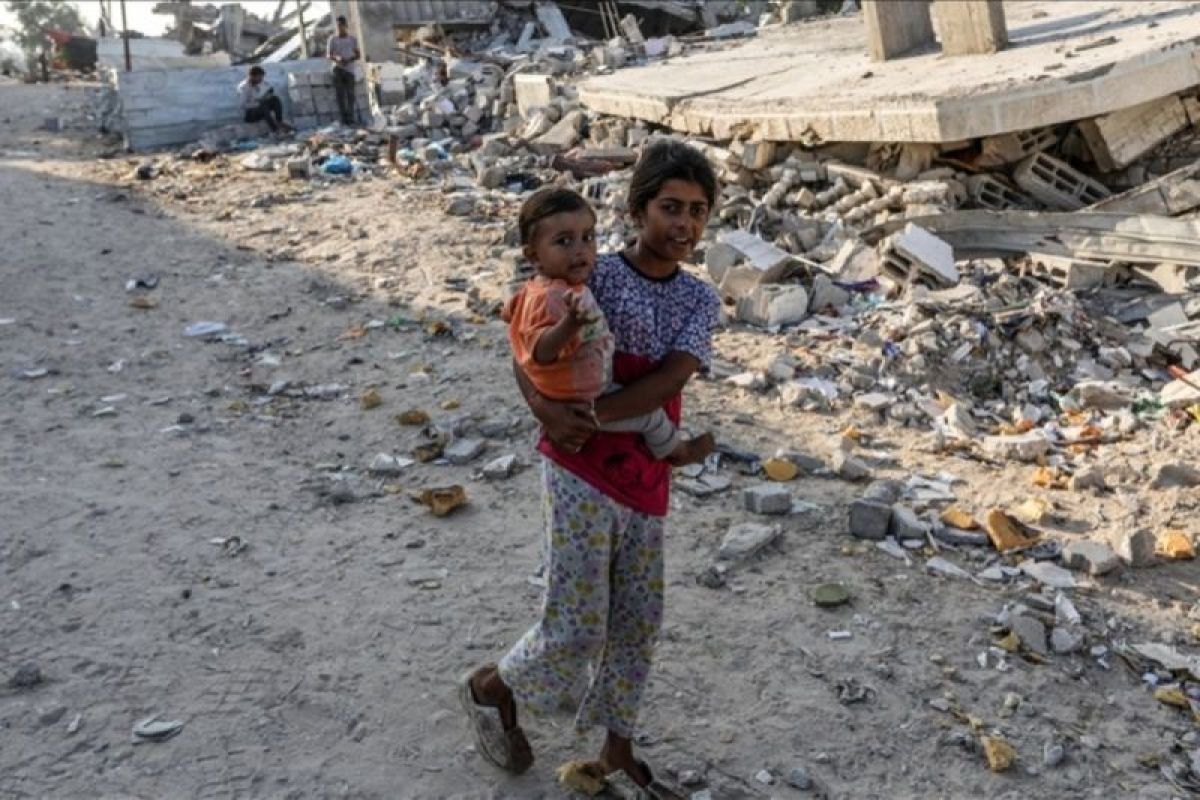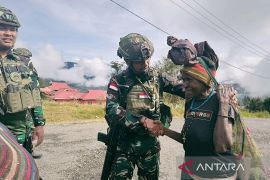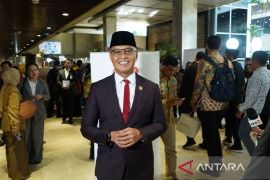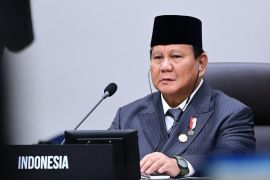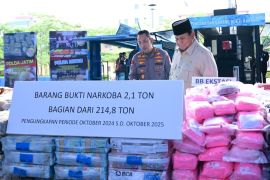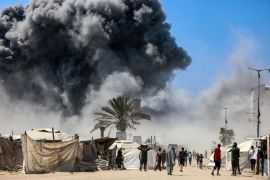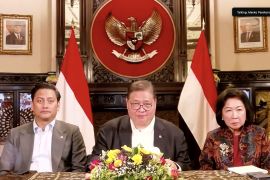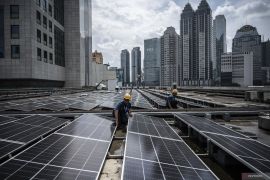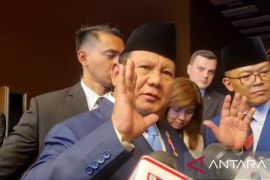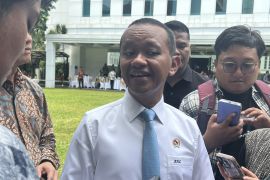The Al-Qassam Brigades, the armed wing of the Hamas group, confirmed the raids by publishing video footage of its fighters infiltrating a number of Israeli military sites.
Meanwhile, Hamas leader Ismail Haniyeh described the attack as a heroic and epic response to Israeli aggression against Al Aqsa Mosque as well as acts of violence committed by Israeli settlers.
During an emergency meeting with senior civil and security officials, Palestinian President Mahmoud Abbas stressed the right of the Palestinian people to defend themselves from terrorism perpetrated by settlers and occupation forces.
In light of continued aggression by the Israeli army and settlers against the Palestinian people, the Al-Qassam Brigades began Operation Al-Aqsa Flood with rocket attacks targeting a number of sites, airports, and military installations.
In response, Israel launched Operation Iron Swords, killing at least 198 Palestinians at the start of its attack on Gaza, according to health authorities in Gaza.
Over the past year, thousands of Gazans have lost their lives due to Israel's onslaught in the Gaza Strip, with the latest death toll recorded at more than 41,800. Meanwhile, the number of injured has crossed 96,800.
The Israeli attacks have also prompted almost the entire population of the area to flee amid an ongoing blockade, which has caused shortages of food, clean water, and medicine.
Potential for escalation
Following its onslaught on the Gaza Strip backed by its main ally, the United States (US), and other Western powers, Israel also attacked Yemen's Houthi group. This was in retaliation for the group's attacks on ships headed to Israel in the Red Sea in early 2024.
The Iran-backed Houthi group stepped up its involvement in the Gaza conflict in support of the Palestinian people facing Israeli "aggression and blockade," Anadolu reported on January 5, 2024.
Meanwhile, the Lebanese Hezbollah Group has also been involved in exchanges of fire along the Lebanon-Israeli border since October 8, 2023, to demonstrate its support for the Palestinian people.
While continuing its attacks on Gaza, Israel has escalated its attacks on Lebanon from September 23, 2024, by conducting shelling along the border, which has so far killed 1,073 people and injured 2,950 others, Anadolu quoted Lebanon's Health Ministry as saying.
And the latest is the attack on Iran. After attempting restraint, Iran launched an attack on Israel on October 2 in response to the killing of Hamas leader Ismail Haniyeh and Hezbollah leader Hassan Nasrallah.
According to international relations observer Teuku Rezasyah, the support from Arab countries and the international community for Palestine in its struggle against Israel is on account of their awareness of Israel's long-standing colonization of Palestine.
"Since Arab countries are now increasingly aware that they should unite their energies to support Palestine," Rezasyah told ANTARA on October 6.
The war, he said, has claimed thousands of lives and caused countless casualties, so the long suffering has fueled physical, mental, and spiritual resistance, involving all forces both inside and outside Palestine.
The Israel-Palestine war, which has been on for decades, has also made the international community increasingly aware that Israel's attacks on Gaza in the past year have been aimed at expanding its colonial territory in Palestine.
"They can see that all this time they have been lulled by the moral coalition of the US, Israel, and European countries who consider Palestine to be the party that must always be blamed," he said.
"However, because of the many and prolonged battles, the world finally discovered that the root cause was the Israeli government," he added.
Amid international concern that the Gaza conflict could likely escalate into a wider regional war, Rezasyah said he believes that Arab countries should increasingly unite forces and look at the crisis in Gaza as joint pressure on Israel to immediately stop attacks and grant independence to Palestine.
This unity also needs to be increased to keep the conflict from spreading into a wider regional war.
"Since after Israel expanded the war to Gaza and Lebanon. Then, the next targets are Jordan and Syria," Rezasyah said, following reports of Israeli bombings near Russian installations in Syria a few days ago.
He further said he is worried that if the attacks continue, Russia could also potentially strike US military bases in the Middle East.
Given the potential for Russia's involvement, the observer, who is also a lecturer of international relations at Padjadjaran University (Unpad), expressed concern about the likelihood of Russia's role being divided with China and North Korea in the conflict.
"Russia is certainly friendly with China. They are also friendly with North Korea. So, there is a potential for a division of roles, for example, Russia might secure the Middle East, while China also supports it in the Taiwan Strait, and North Korea plays its role in the Korean Peninsula," he explained.
Brokering peace
To prevent the escalation of the Gaza war to a broader regional conflict, the UN should appoint a special envoy to directly monitor the development of the situation and the tensions simmering in the Middle East, Rezasyah said.
The situation in the region should not only be seen from a humanitarian perspective, but also from the aspect of war itself.
Hence, the UN should use its power more firmly to pay attention to world peace.
Rezasyah further said that the UN Security Council membership needs to be updated so that the decisions made at the council represent the aspirations of the wider international community and are not limited to the five current permanent members.
Meanwhile, amid calls from the international community for the need to improve membership of the UN Security Council following the Israeli-Palestinian war, he urged the new Indonesian government, under the leadership of President Prabowo Subianto, to work for peace in Palestine.
He said that Prabowo has the potential to be a reliable leader in resolving the Israeli-Palestinian conflict, given that his leadership represents the Indonesian people, as part of the international community, whose numbers are much larger.
In addition, Indonesia has the potential to become a major economic power by 2030. It also has the potential to have a very large demographic bonus.
"So, today is the right momentum for Prabowo to prove that Indonesia upholds its Constitution well and consistently, especially the Constitution in Article 1, that independence is the right of all nations, and in the last paragraph, Indonesia is even involved in world peace," he said.
With the war seemingly not expected to end anytime soon, people around the world should work together to promote peaceful solutions and support a two-state solution so that Palestine can gain independence and peace can prevail across the world.
Related news: From Indonesia with love: Peanut seller collects funds for Palestine
Related news: Dialogue as solution to resolve Middle East conflict: President
Editor: Azis Kurmala
Copyright © ANTARA 2024
